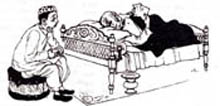

Gandhi's First Lesson In Non-violence |
"Mohandas gave up the idea of ever eating meat again, but he was now most eager to get big and grown up. Every child passes through this stage, when he tries to imitate his elders. He tries to behave and act like them and thus thinks himself to be grown up. Whenever Mohandas saw his uncle smoking, he would feel a strong desire to smoke also. When Mohandas was about fourteen, one of his friends decided to start smoking cigarettes. But neither of them had any money and cigarettes could not be had without money. The problem, however, was solved by picking up the stubs of the cigarettes that his uncle had smoked. But after a time this failed to satisfy them, and then they began to steal money from the servant's pockets in order to buy cigarettes. Very soon they felt that they could not enjoy their cigarettes when they had to smoke them in this stealthy way. They thought life was hardly worth living when they could not smoke a cigarette freely and openly as their elders did. This thought greatly disappointed them, and they decided to commit suicide. They collected the poisoned seeds of the dhatura16 and decided one evening to eat them. Just when they were about to eat those seeds, it struck them that the poison might not work. What then? How could they ever face their elders after the failure? And so they gave up their idea; and from that day the desire for smoking cigarettes was gone." "But, mother, surely he must have smoked when he grew up?" "No, my darling. He never touched a cigarette since that day." "One day, Mohandas was working at his lessons in his room when his brother came in. He was looking very worried and, coming close to Mohandas, he whispered something in his ear. The brother had gone into a debt of some twenty-five rupees, and he wanted Mohandas to help him out. After much careful thinking, Mohandas hit upon a plan. He quietly went to his brother when he was asleep, and stole a little gold from his armlet. Next morning the gold was sold and the debt was cleared." "But, mother, you have always told me that stealing is wrong. How then can you explain Mohandas's action?" "Hari dear, children often do wrong without knowing what they are doing. But good children are sorry for their mistakes when they come to know of them and never commit them again. " In order to help one brother, Mohandas had stolen a hit of gold of the other brother. But by doing so he had lost all peace of mind and he could not decide what amends he should make for the wrong that he had done. At last he decided to tell his father the whole truth. He wrote a letter to him, telling him all about the incident. At the same time he promised his father that he would never steal again. He asked his father to punish him as severely as he wished and begged him not to feel pained about it in any way. The father was ill at the time and had to lie in bed all day. Mohandas went up to him, handed the letter and sat down quietly near the bed.  As the father read that letter, tears began to roll down his cheeks. And as he watched the tears, Mohandas's heart sank with shame and remorse. His father's tears affected him very deeply, and this time he took a silent vow never to do an unrighteous deed again. This incident marked a turning-point in his life and he strove ever after to be ever good and truthful." "But, mother, why did his father cry so bitterly? Why did he not beat Mohandas or punish him in some other way?" "Because, my son, Mohandas's courage and truthfulness moved him deeply. If he had given the boy a beating, that would not have been so effective as his own gentle suffering. And that suffering and that love left its impression on Mohandas far more deeply than any beating could ever have done. This was Mohan's first lesson in non-violence. And later on it was this very weapon with which he fought the British, and won freedom for his country. The incident of the stealing was soon forgotten, but the father began to love Mohan and trust him more and more. This was only natural, for had not Mohan shown how good and truthful he was?" "I promise, mother, I, too, will always tell the truth, and then I am sure father will love me more and more." "Yes, my son. Not your father alone, but every one who loves and honours the truthful." "But let us proceed with the story, mother. What happened to Mohan after that?" "His father's health now began to decline. Every one in the house did what he could for him. But Mohandas took special pains to nurse him and look after him. He would rush home from school as soon as possible, and then attend on his father. He would give him his medicines, change his clothes, and massage his aching legs and feet for hours. One night, he had just left his father and gone to his room for something, when a servant knocked at his door and told him that his father had passed away. Mohandas could never forgive himself for not having been near his father during his last moments and this thought hurt him and pained him throughout his life. He was about seventeen when he lost his father. "Alas ! Poor boy ! How bitterly he must have cried at his father's death!" "Yes, my son. But today he himself is dead and the whole of India, nay, the whole world, weeps for him and mourns his death!" 16. Poisonous plant. |